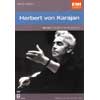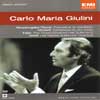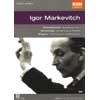Igor Markevitch
Contrasted and fascinating portraits of powerful musical talents in their prime
View record and artist detailsRecord and Artist Details
Composer or Director: Hector Berlioz
Genre:
DVD
Label: EMI
Magazine Review Date: 10/2003
Media Format: Digital Versatile Disc
Media Runtime: 63
Mastering:
Stereo
Catalogue Number: 490112-9

Tracks:
| Composition | Artist Credit |
|---|---|
| Symphonie fantastique |
Hector Berlioz, Composer
Hector Berlioz, Composer Herbert von Karajan, Conductor Orchestre de Paris |
| (Le) Corsaire |
Hector Berlioz, Composer
Hallé Orchestra Hector Berlioz, Composer John Barbirolli, Conductor |
Composer or Director: Giuseppe Verdi, Modest Mussorgsky, Manuel de Falla, Gioachino Rossini, Wolfgang Amadeus Mozart
Genre:
DVD
Label: EMI
Magazine Review Date: 10/2003
Media Format: Digital Versatile Disc
Media Runtime: 84
Mastering:
Stereo
Catalogue Number: 490114-9

Tracks:
| Composition | Artist Credit |
|---|---|
| Pictures at an Exhibition |
Modest Mussorgsky, Composer
Carlo Maria Giulini, Conductor Modest Mussorgsky, Composer Philharmonia Orchestra |
| Symphony No. 40 |
Wolfgang Amadeus Mozart, Composer
Carlo Maria Giulini, Conductor New Philharmonia Orchestra Wolfgang Amadeus Mozart, Composer |
| (El) Sombrero de tres picos, Movement: Suite No. 2 (Three dances) |
Manuel de Falla, Composer
Carlo Maria Giulini, Conductor Manuel de Falla, Composer New Philharmonia Orchestra |
| (I) Vespri siciliani, '(The) Sicilian Vespers', Movement: Overture |
Giuseppe Verdi, Composer
Carlo Maria Giulini, Conductor Giuseppe Verdi, Composer New Philharmonia Orchestra |
| Semiramide, Movement: Overture |
Gioachino Rossini, Composer
Gioachino Rossini, Composer Guido Cantelli, Conductor Milan La Scala Orchestra |
Composer or Director: Igor Stravinsky, Richard Wagner, Dmitri Shostakovich
Genre:
DVD
Label: EMI
Magazine Review Date: 10/2003
Media Format: Digital Versatile Disc
Media Runtime: 443
Mastering:
Stereo
Catalogue Number: 490 110-9

Tracks:
| Composition | Artist Credit |
|---|---|
| Tannhäuser, Movement: Overture |
Richard Wagner, Composer
ORTF National Orchestra Richard Wagner, Composer |
| Tristan und Isolde, Movement: Prelude and Liebestod (concert version: arr. Humpe |
Richard Wagner, Composer
Igor Markevitch, Conductor ORTF National Orchestra Richard Wagner, Composer |
| Symphony No. 1 |
Dmitri Shostakovich, Composer
Dmitri Shostakovich, Composer Igor Markevitch, Conductor ORTF National Orchestra |
| Symphony of Psalms |
Igor Stravinsky, Composer
Igor Markevitch, Conductor Igor Stravinsky, Composer ORTF Chorus ORTF Philharmonic Orchestra |
| (The) Firebird |
Igor Stravinsky, Composer
Igor Stravinsky, Composer Igor Stravinsky, Conductor New Philharmonia Orchestra |
Author: Edward Greenfield
Markevitch as conductor provides an extreme contrast. Even when he inspires passionate playing in Wagner’s Tannhäuser Overture and the Tristan Prelude and Liebestod, the look on his face is of a grimly impassive professor. After a warmly idiomatic reading of Shostakovich’s First Symphony, the Symphony of Psalms here has some passionate moments but also patches of rough ensemble, and the chorus is not always secure. None of the French recordings match the BBC recording of Stravinsky in sound.
The film of Berlioz’s Symphonie fantastique with Karajan and the Orchestre de Paris in 1970 and never published before, is another matter. Unlike the other films in this batch, it is shot in colour, with images sharply focused against a bright background of Indian red. Here, too, you have an impassive-looking conductor, one who closes his eyes while he conducts; but unlike Markevitch, whose appearance hardly reflects his interpretation, Karajan lets you see as well as hear every nuance in a characteristically moulded performance. His approach might seem self-indulgent, except that from first to last he generates the highest voltage of electricity. As Richard Osborne points out in his note, Karajan’s Paris period may have been brief, but, even more than his commercial recordings, this film makes it quite clear what he was achieving with this recently founded prestigious French orchestra.
Le Corsaire with Barbirolli is an enjoyable if hardly generous bonus. Both expression and body language reflects the passionate warmth of his response to Berlioz.
It is good, too, to be reminded of the young Giulini, when the fire still burned brightly. The Mussorgsky Pictures, in Ravel’s orchestration, a favourite showpiece of his, was recorded in Watford Town Hall with the Philharmonia in March 1964 only days before Walter Legge tried to disband the great orchestra he had founded; the opening suggests an untypical heaviness of spirit, which evaporates as the performance progresses, though the television sound lacks brilliance. Giulini hypnotises the players (by this time reconstituted as the New Philharmonia) with his deeply involved, often agonised facial expressions. If the reading of the Mozart G minor Symphony nowadays seems to belong to another age with its romantically moulded Andante (and no first movement exposition repeat), it is a civilised account. The Falla brings music-making of quite a different order, daring and colourful, with Giulini seeming to shout or sing at the climax of the final dance.
The bonus track takes us back to the 1950 Edinburgh Festival when Guido Cantelli rehearsed the Orchestra of La Scala in Rossini’s Semiramide Overture. This is a tantalising clip of less than four minutes. No verbal instruction from the then newly risen, star among Italian conductors, yet the magnetism which so impressed the music world is clear enough.
Discover the world's largest classical music catalogue with Presto Music.

Gramophone Digital Club
- Digital Edition
- Digital Archive
- Reviews Database
- Full website access
From £8.75 / month
Subscribe
Gramophone Full Club
- Print Edition
- Digital Edition
- Digital Archive
- Reviews Database
- Full website access
From £11.00 / month
Subscribe
If you are a library, university or other organisation that would be interested in an institutional subscription to Gramophone please click here for further information.




